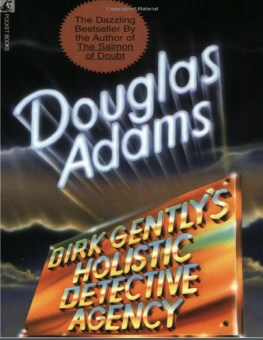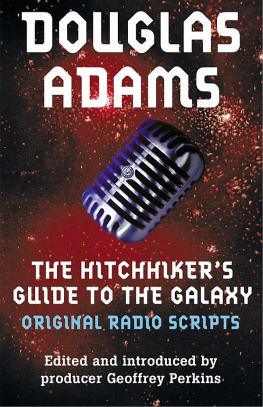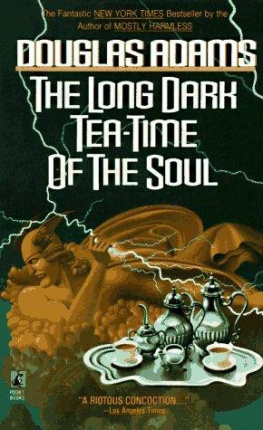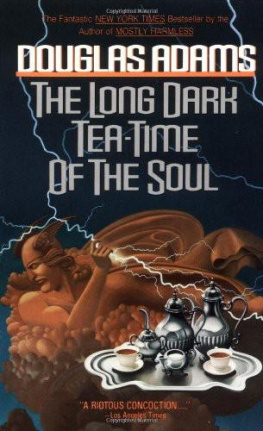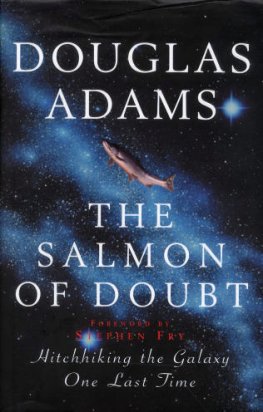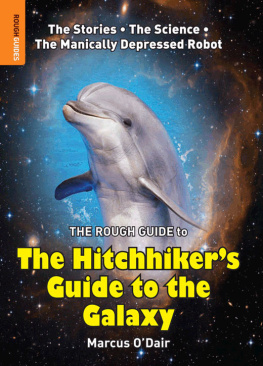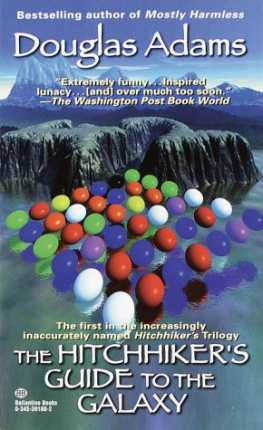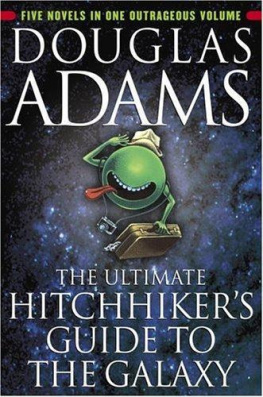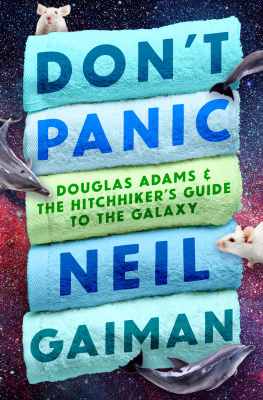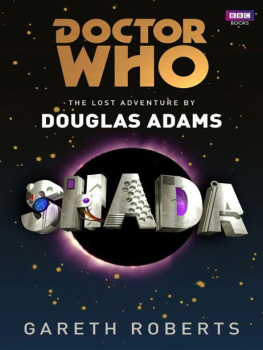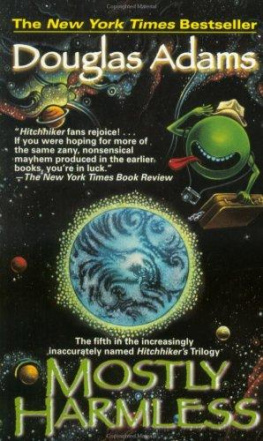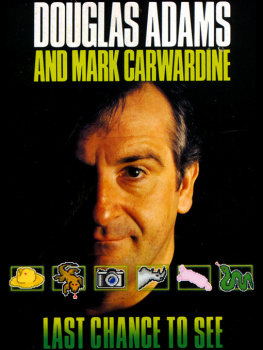Douglas Adams - The Ultimate Hitchhikers Guide to the Galaxy
Here you can read online Douglas Adams - The Ultimate Hitchhikers Guide to the Galaxy full text of the book (entire story) in english for free. Download pdf and epub, get meaning, cover and reviews about this ebook. year: 2009, publisher: Del Rey, genre: Detective and thriller. Description of the work, (preface) as well as reviews are available. Best literature library LitArk.com created for fans of good reading and offers a wide selection of genres:
Romance novel
Science fiction
Adventure
Detective
Science
History
Home and family
Prose
Art
Politics
Computer
Non-fiction
Religion
Business
Children
Humor
Choose a favorite category and find really read worthwhile books. Enjoy immersion in the world of imagination, feel the emotions of the characters or learn something new for yourself, make an fascinating discovery.

- Book:The Ultimate Hitchhikers Guide to the Galaxy
- Author:
- Publisher:Del Rey
- Genre:
- Year:2009
- Rating:4 / 5
- Favourites:Add to favourites
- Your mark:
- 80
- 1
- 2
- 3
- 4
- 5
The Ultimate Hitchhikers Guide to the Galaxy: summary, description and annotation
We offer to read an annotation, description, summary or preface (depends on what the author of the book "The Ultimate Hitchhikers Guide to the Galaxy" wrote himself). If you haven't found the necessary information about the book — write in the comments, we will try to find it.
The Ultimate Hitchhikers Guide to the Galaxy — read online for free the complete book (whole text) full work
Below is the text of the book, divided by pages. System saving the place of the last page read, allows you to conveniently read the book "The Ultimate Hitchhikers Guide to the Galaxy" online for free, without having to search again every time where you left off. Put a bookmark, and you can go to the page where you finished reading at any time.
Font size:
Interval:
Bookmark:
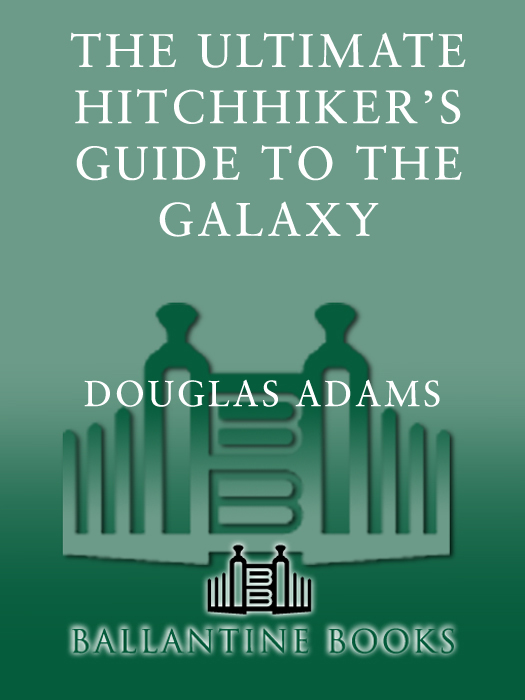
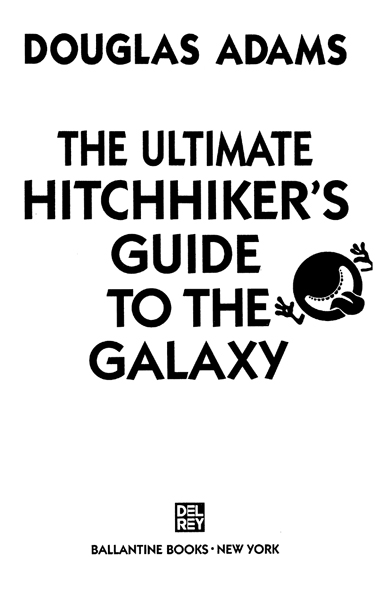
A Del Rey Book
Published by The Random House Publishing Group
The Hitchhikers Guide to the Galaxy, copyright 1979 by Douglas Adams
The Restaurant at the End of the Universe, copyright 1980 by Douglas Adams
Life, the Universe and Everything, copyright 1982 by Douglas Adams
So Long, and Thanks for All the Fish, copyright 1985 by Douglas Adams
Young Zaphod Plays It Safe, copyright 1986 by Douglas Adams
Mostly Harmless, copyright 1992 by Serious Productions
Foreword copyright 2002 by Neil Gaiman
Introduction copyright 1986 by Douglas Adams
All rights reserved.
Published in the United States by Del Rey Books, an imprint of The Random House Publishing Group, a division of Random House, Inc., New York. This edition was previously published by Random House Value Publishing as The Ultimate Hitchhikers Guide and also in separate volumes.
Grateful acknowledgment is given for lyric excerpts from Youll Never Walk Alone by Richard Rogers and Oscar Hammerstein II. Copyright 1945 by Williamson Music, Inc. Copyright renewed. All rights managed by T. B. Harms Company c/o The Welk Music Group. International copyright secured. All rights reserved. Used by permission.
Del Rey is a registered trademark and the Del Rey colophon is a trademark of Random House, Inc.
www.delreybooks.com
eISBN: 978-0-307-49846-5
v3.1
What Was He Like,
Douglas Adams?
He was tall, very tall. He had an air of cheerful diffidence. He combined a razor-sharp intellect and understanding of what he was doing with the puzzled look of someone who had backed into a profession that surprised him in a world that perplexed him. And he gave the impression that, all in all, he was rather enjoying it.
He was a genius, of course. Its a word that gets tossed around a lot these days, and its used to mean pretty much anything. But Douglas was a genius, because he saw the world differently, and more importantly, he could communicate the world he saw. Also, once youd seen it his way you could never go back.
Douglas Noel Adams was born in 1952 in Cambridge, England (shortly before the announcement of an even more influential DNA, deoxyribonucleic acid). He was a self-described strange child who did not learn to speak until he was four. He wanted to be a nuclear physicist (I never made it because my arithmetic was so bad), then went to Cambridge to study English, with ambitions that involved becoming part of the tradition of British writer/performers (of which the members of Monty Pythons Flying Circus are the best-known example).
When he was eighteen, drunk in a field in Innsbruck, hitchhiking across Europe, he looked up at the sky filled with stars and thought, Somebody ought to write the Hitchhikers Guide to the Galaxy. Then he went to sleep and almost, but not quite, forgot all about it.
He left Cambridge in 1975 and went to London where his many writing and performing projects tended, in the main, not to happen. He worked with former Python Graham Chapman writing scripts and sketches for abortive projects (among them a show for Ringo Starr which contained the germ of Starship Titanic) and with writer-producer John Lloyd (they pitched a series called Snow Seven and the White Dwarfs, a comedy about two astronomers in an observatory on Mt. EverestThe idea for that was minimum casting, minimum set, and wed just try to sell the series on cheapness).
He liked science fiction, although he was never a fan. He supported himself through this period with a variety of odd jobs: he was, for example, a hired bodyguard for an oil-rich Arabian family, a job that entailed wearing a suit and sitting in hotel corridors through the night listening to the ding of passing elevators.
In 1977 BBC radio producer (and well-known mystery author) Simon Brett commissioned him to write a science fiction comedy for BBC Radio Four. Douglas originally imagined a series of six half-hour comedies called The Ends of the Earthfunny stories which at the end of each, the world would end. In the first episode, for example, the Earth would be destroyed to make way for a cosmic freeway.
But, Douglas soon realized, if you are going to destroy the Earth, you need someone to whom it matters. Someone like a reporter for, yes, the Hitchhikers Guide to the Galaxy. And someone else a man who was called Alaric B in Douglass original proposal. At the last moment Douglas crossed out Alaric B and wrote above it Arthur Dent. A normal name for a normal man.
For those people listening to BBC Radio 4 in 1978 the show came as a revelation. It was funnygenuinely witty, surreal, and smart. The series was produced by Geoffrey Perkins, and the last two episodes of the first series were co-written with John Lloyd.
(I was a kid who discovered the seriesaccidentally, as most listeners didwith the second episode. I sat in the car in the driveway, getting cold, listening to Vogon poetry, and then the ideal radio line Ford, youre turning into an infinite number of penguins, and I was happy; perfectly, unutterably happy.)
By now, Douglas had a real job. He was the script editor for the long-running BBC SF series Doctor Who, in the Tom Baker days.
Pan Books approached him about doing a book based on the radio series, and Douglas got the manuscript for The Hitchhikers Guide to the Galaxy in to his editors at Pan slightly late (according to legend they telephoned him and asked, rather desperately, where he was in the book, and how much more he had to go. He told them. Well, said his editor, making the best of a bad job, just finish the page youre on and well send a motorbike around to pick it up in half an hour). The book, a paperback original, became a surprise bestseller, as did, less surprisingly, its four sequels. It spawned a bestselling text-based computer game.
The Hitchhikers Guide to the Galaxy sequence used the tropes of science fiction to talk about the things that concerned Douglas, the world he observed, his thoughts on Life, the Universe, and Everything. As we moved into a world where people really did think that digital watches were a pretty neat thing, the landscape had become science fiction and Douglas, with a relentless curiosity about matters scientific, an instinct for explanation, and a laser-sharp sense of where the joke was, was in a perfect position to comment upon, to explain, and to describe that landscape.
I read a lengthy newspaper article recently demonstrating that Hitchhikers was in fact a lengthy tribute to Lewis Carroll (something that would have come as a surprise to Douglas, who had disliked the little of Alice in Wonderland he read). Actually, the literary tradition that Douglas was part of was, at least initially, the tradition of English Humor Writing that gave us P. G. Wodehouse (whom Douglas often cited as an influence, although most people tended to miss it because Wodehouse didnt write about spaceships).
Douglas Adams did not enjoy writing, and he enjoyed it less as time went on. He was a bestselling, acclaimed, and much-loved novelist who had not set out to be a novelist, and who took little joy in the process of crafting novels. He loved talking to audiences. He liked writing screenplays. He liked being at the cutting edge of technology and inventing and explaining with an enthusiasm that was uniquely his own. Douglass ability to miss deadlines became legendary. (I love deadlines, he said once. I love the whooshing sound they make as they go by.)
Font size:
Interval:
Bookmark:
Similar books «The Ultimate Hitchhikers Guide to the Galaxy»
Look at similar books to The Ultimate Hitchhikers Guide to the Galaxy. We have selected literature similar in name and meaning in the hope of providing readers with more options to find new, interesting, not yet read works.
Discussion, reviews of the book The Ultimate Hitchhikers Guide to the Galaxy and just readers' own opinions. Leave your comments, write what you think about the work, its meaning or the main characters. Specify what exactly you liked and what you didn't like, and why you think so.


